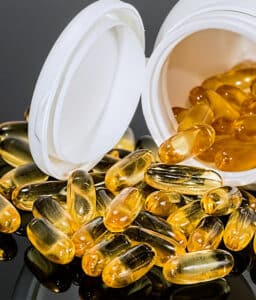Antioxidants
Internet articles and advertisements often tout the various health benefits of antioxidants. For example, it slows down aging, reduces (or even prevents) the risks of heart disease and cancer, improves vision, etc.
And thanks to all this information, we know that antioxidants are good, and the more of them in our body, the better.
But what are antioxidants? What are they doing and why do we need them?
And is it true that the more the better?
What are antioxidants?
Antioxidants are a general term for any compound that can neutralize unstable molecules called free radicals that damage DNA, cell membranes, and other cellular components.
There are hundreds, perhaps thousands, of different substances that can act as antioxidants. The most well-known antioxidants are Vitamins C and E, minerals (eg copper, zinc, selenium, manganese), beta carotene and others carotenoids, glutathione, coenzyme Q10, lipoic acid, flavonoids, phenols, polyphenols, phytoestrogens, tannins ... which, in addition to other important functions, also serve as antioxidants in our body - neutralize free radicals.
But antioxidants are also different:
- Some substances that act as antioxidants in one situation can act in the opposite way in another – as pro-oxidants (substances that attract electrons instead of giving them away);
- Each antioxidant has unique chemical behavior and biological properties, so they are not interchangeable.
Antioxidants in our body:
- Formed naturally - as a result of metabolism or in response to the harmful effects of the external environment (various toxins such as tobacco smoke, etc.);
- Are taken with food.
The best sources of antioxidants are plant-based foods - fruits, vegetables, whole grain products, nuts, seeds, herbs and spices.
Antioxidants can also increase the shelf life of foods. Therefore, they are often used as food additives. For example, vitamin C is often added to processed foods as a preservative.
What are free radicals?
Free radicals are unstable molecules that are formed during normal cellular metabolism (chemical changes occurring in the cell).
By nature, they are molecules that consist of atoms with an incomplete set of electrons.
These molecules try to stabilize themselves by "stealing" electrons from other molecules and damaging these other molecules in the process.
Antioxidants neutralize free radicals by "donating" some of their electrons and thus convert free radicals into stable molecules that no longer damage our body's cells.
The uniqueness of antioxidants is that they can "give away" electrons without becoming free radicals themselves.
Although free radicals are inherently harmful, they are an inevitable part of our lives:
- Our body produces free radicals in response to harmful environmental influences, such as tobacco smoke, ultraviolet rays, and air pollution;
- Free radicals are also a natural byproduct of normal processes in the cells of our body. For example, when the immune system tries to fight "invaders", it uses free radicals to destroy viruses, bacteria, and damaged cells of the body;
- Free radicals are also formed during exercise and are considered necessary, for example, to increase the sensitivity of muscle cells to insulin.
Accordingly, the presence of free radicals in our bodies is natural and normal. And although they can cause serious health problems in large quantities, they also perform important functions necessary for our health.
Therefore, you do not need to try to get rid of free radicals, but you need to maintain a certain balance of free radicals and antioxidants.
If the amount of free radicals is too large, occurs a condition called oxidative stress.
Prolonged oxidative stress can damage DNA and other molecules in our bodies.
DNA damage, in turn, increases the risk of cancer, and some scientists believe that this is one of the main causes of the aging process.
A number of lifestyle and environmental factors are known to contribute to excess free radical production and oxidative stress, including:
- Air pollution (including cigarette smoke);
- Alcohol;
- Toxins;
- High blood sugar;
- A large amount of polyunsaturated fatty acids in the diet;
- Excessive sunbathing;
- Bacterial, fungal or viral infections;
- Excessive intake of iron, magnesium, copper or zinc;
- Too much or too little oxygen in the body;
- Intense and prolonged physical exertion that causes tissue damage;
- Excessive intake of antioxidants such as vitamins C and E;
- Antioxidant deficiency.
Antioxidants in food
Antioxidants are essential for the survival of all living things and plants because they protect against free radicals and oxidative damage. Thus, antioxidants are found in all raw products of plant and animal origin.
Many antioxidants are pigments that give plants their characteristic color.
Accordingly, the amount of antioxidants can be determined by the intensity of the coloring of vegetables and fruits - red cabbage has more pigment than usual, red onion has more than white, dark grapes have more than light, etc.
Different colors consist of different pigments, therefore, in order to provide the body with all the antioxidants it needs, it is recommended to combine fruits, berries, and vegetables of different colors in the diet.
However, pigments are only part of a wide range of antioxidants. For example, the total amount of antioxidants in white potatoes is higher than in sweet potatoes. Color is a good indicator of antioxidant diversity, but white vegetables such as cauliflower should also be included in the diet.
There are hundreds of different antioxidants in foods. Here are some of the best known and most researched:
- Anthocyanins. These pigments produce blue, purple, and red colors in fruits and vegetables such as berries, grapes, cranberries, eggplant, beets, and red cabbage, as well as in red wine. As the body ages, anthocyanins help protect the brain and prevent dementia;
- Carotenoids. These pigments give bright orange, red and yellow shades to fruits and vegetables such as carrots, oranges, grapefruit, and pumpkin... Carotenoids such as lutein and beta-carotene are also found in leafy greens, such as spinach. Carotenoids are essential for eye health, as well as for other functions;
- Terpenoids. These antioxidants are found in foods such as garlic, onion, cauliflower, coconut, and whole grains. They help fight pathogens such as fungi, parasites, and viruses;
- Vitamin C. Water-soluble vitamin C is found in many fruits, such as citrus fruits, berries and kiwis, and vegetables such as bell peppers and Brussels sprouts. Vitamin C has several functions and is vital for the development of bones, muscles, cartilage and blood vessels;
- Vitamin E. Vitamin E is found in green leafy vegetables, seeds, nuts, and vegetable oils. The alpha-tocopherol form of vitamin E acts as an antioxidant.
- Zinc is found in the greatest amount in meat, fish, and seafood, especially in oysters. Eggs and dairy products also contain zinc. Breakfast cereals and other foods, such as flour, are sometimes enriched with zinc. Zinc is essential for the immune system, cell growth, and blood clotting, which is necessary for wound healing.
Foods with high antioxidant content
Let's take a look at some foods with a relatively high antioxidant content (measured in millimoles (1 thousandth part mole) per 100 grams):
Product | Amount of antioxidants |
Artichokes (boiled) | 4,5 |
Blueberries | 9 |
Black chokeberries | 13,5 |
Chocolate (unsweetened) | 10 |
Cloves (dried, ground) | 126 |
Coffee beans (roasted) | 23 |
Oregano (dried) | 96 |
Pecans (shelled) | 10,5 |
Saffron (dried, ground) | 63 |
Walnuts (with shell) | 16 |
Plant foods have an average of 64 times more antioxidants than animal foods. Especially berries - they contain about 10 times more antioxidants than fruits and vegetables. The highest amount of antioxidants have herbs and spices.
Prooxidants in food
Some foods contain pro-oxidants - substances with the opposite effect of antioxidants, which can contribute to oxidative stress. Although pro-oxidants can also provide some health benefits, it is important to balance them with foods rich in antioxidants.
Food products with pro-oxidant effect
Try to limit the amount of these pro-oxidant foods in your diet:
- Sugar (sweetened drinks, packet juices, candies, various desserts...);
- Refined carbohydrates (white flour and its products, rice, bread...);
- Processed meat (high fat content can contribute to inflammation and prooxidation).
Emphasis is on the word "limit", this does not mean that these products should be given up completely -😊
Also, the effect of these substances in different foods is different, for example, by consuming sweetened drinks, you will reduce the total content of antioxidants in the blood.
But consuming the same amount of sugar with freshly squeezed orange juice will not reduce the amount of antioxidants in the blood, because freshly squeezed orange juice also contains natural vitamin C, which acts as an antioxidant.
In addition, a source of fat, such as whipped cream, has a strong oxidizing effect.
But nuts, avocados, or extra virgin olive oil (which also contains a large amount of fat) do not have the same effect due to their natural antioxidants.
What do I mean by that?
If you really like white bread, cakes, and other similar products and cannot refuse them – eat more fresh berries, thus balancing the action of pro-oxidants.
Should You Take Antioxidant Supplements?
Dietary intake of antioxidants is essential for optimal health, but more is not always better.
Excessive intake of certain antioxidants can have toxic effects, which may even promote rather than prevent oxidative damage (antioxidant paradox).
Some studies suggest that high doses of antioxidants may even increase the risk of death.
For this reason, it is recommended to avoid high doses of antioxidants (with dietary supplements), but to eat foods rich in antioxidants. Studies show that dietary antioxidants reduce oxidative damage better than dietary supplements because dietary compounds act synergistically. Taking only one or two isolated antioxidants will not have the same positive effect.
However, if you lack certain nutrients, dietary supplements (e.g. multivitamins) in small doses may be beneficial.
Key takeaways
Adequate intake of antioxidants is very important, but in large doses, they can be harmful.
Our body needs hundreds of different antioxidants – so focusing on just one or a few antioxidants can be counterproductive or even harmful.
Balanced and healthy diet is the best way to get your daily dose of antioxidants. To get the antioxidants we need, we need to include enough vegetables, fruits, berries, seeds and nuts in our diet. A good example of using these products in cooking is Mediterranean diet.
Pay attention to what you eat - each meal can tip the prooxidant to antioxidant balance one way or the other.
Eat "colorful" and be healthy!
Sources:
Free Radicals, Antioxidants in Disease and Health
Oxidative stress, prooxidants, and antioxidants: the interplay
Inside the neutrophil phagosome: oxidants, myeloperoxidase, and bacterial killing
Free radicals hasten head and neck cancer risk
Oxidative stress, aging, and diseases
Oxidative stress in type 2 diabetes: the role of fasting and postprandial glycaemia
Acute hyperglycemia induces an oxidative stress in healthy subjects
Generation of reactive oxygen species by the mitochondrial electron transport chain
Exercise-induced oxidative stress: cellular mechanisms and impact on muscle force production
Ascorbate deficiency and oxidative stress in the alveolar type II cell
Zinc in Wound Healing Modulation
Diseases related to oxygen-derived free radicals
The excessive use of antioxidant therapy: A possible cause of male infertility?
Antioxidant supplements for prevention of gastrointestinal cancers
Meta-analysis: high-dosage vitamin E supplementation may increase all-cause mortality
Orange juice vs vitamin C: effect on hydrogen peroxide-induced DNA damage in mononuclear blood cells

Help to maintain this site, create interesting articles and delicious low-calorie recipes!
Share this article
Follow me on Facebook
I recommend reading these articles as well

Why skipping meals and starving do not lead to weight loss?
Why eating less and starving yourself is more likely to make you gain weight than lose it?

GAPS protocol diet
What is the GAPS diet? How healthy is it? Are the promises of the GAPS diet true?

Nutritional supplements
What exactly are nutritional supplements? Can they help us improve our health and lose weight? Do they help improve athletic performance and relieve joint pain...

Sugar substitutes
The sugar substitutes discussed in this article are good alternatives for people who are not advised to use sugar due to illness or being overweight. The key word here is alternatives, which means that they should be used instead of refined sugar - and in moderation.

